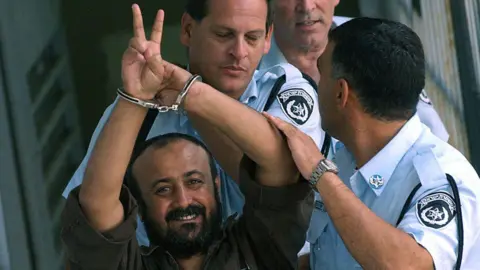In the heart of a delicate Middle East peace negotiation, Hamas is pushing back against Israel’s proposed prisoner release list, insisting on the inclusion of several prominent Palestinian figures. Like a game of high-stakes chess where every move carries grave consequences, this development threatens to complicate an already fragile ceasefire agreement.
The Israeli justice ministry’s list of 250 prisoners notably excludes seven high-profile Palestinians, including Marwan Barghouti and Ahmad Saadat – men who have become powerful symbols of Palestinian resistance. Barghouti, serving five life sentences plus 40 years for orchestrating attacks that killed five civilians, maintains remarkable popularity among Palestinians. Recent polling suggests he would outperform both current Palestinian Authority President Mahmoud Abbas and Hamas leadership in a presidential election.
As we’ve seen time and again in this troubled region, what might seem like a straightforward prisoner exchange becomes entangled in decades of conflict and competing narratives. Saadat, who leads the Popular Front for the Liberation of Palestine, is serving a 30-year sentence for heading what Israeli courts deemed an “illegal terrorist organization” and involvement in various attacks, including a minister’s assassination in 2001.
The proposed exchange would see twenty Israeli hostages released by Monday morning, alongside the return of deceased hostages’ remains. In return, Israel would free approximately 250 Palestinians serving life sentences and release an additional 1,700 detained Gazans.
Among those slated for release is Iyad Abu al-Rub, an Islamic Jihad commander convicted of orchestrating suicide bombings that claimed thirteen Israeli lives in the early 2000s. The justice ministry indicates he would face deportation either to Gaza or abroad.
The complexity of this situation reminds one of an old Texas saying: “The devil’s in the details, and there sure are a lot of devils.” U.S. envoy Steve Witkoff has reportedly promised to raise these concerns with Israeli Prime Minister Benjamin Netanyahu, though Israel maintains its firm stance against including certain high-profile prisoners.
As the sun sets on another day of negotiations, the question remains whether this disagreement will derail the broader ceasefire agreement – a deal that offers a glimmer of hope for ending two years of devastating conflict in Gaza. Like a carefully constructed house of cards, each element must be perfectly balanced to prevent total collapse.
This is the kind of story that keeps unfolding, layer by layer, revealing the intricate web of Middle Eastern politics where nothing is ever quite as simple as it first appears. And that’s the way it is – for now.


